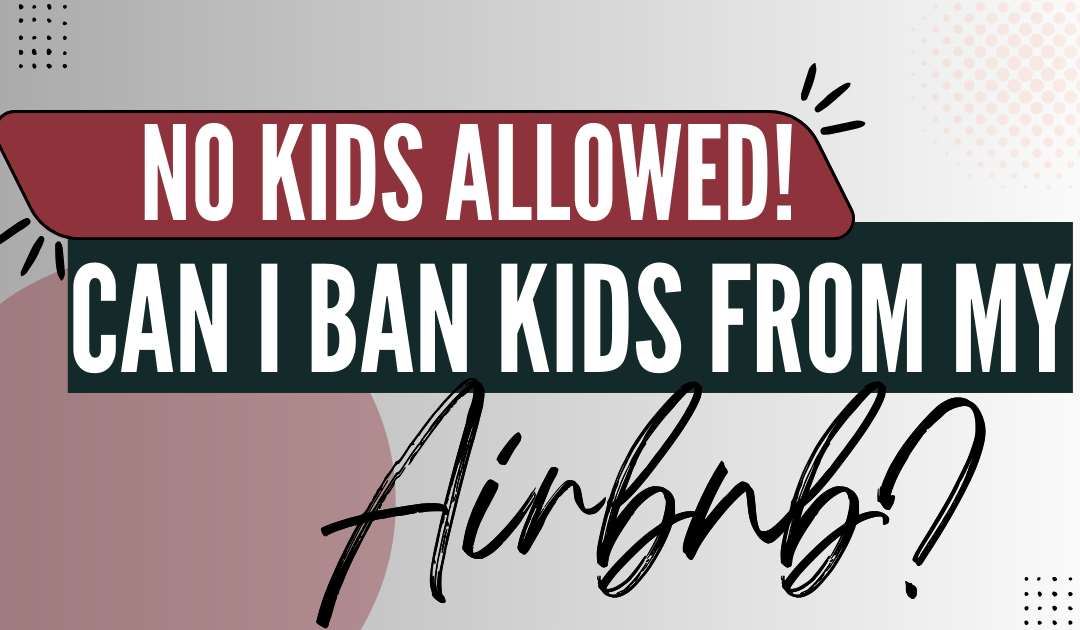Hey hosts! I want to talk about a topic that I’ve noticed many Airbnb hosts don’t fully understand – allowing kids at your property. If you’ve ever said, “I don’t allow kids at my property” or “This place isn’t safe for toddlers,” you might not be aware that this could land you in hot water with Airbnb. Let’s dive into why not allowing kids at your property is against Airbnb’s terms of service and, more importantly, what you can do to protect both your property and your guests while staying compliant with the terms of service.
Why Saying “No Kids Allowed” at Your Airbnb Is a Problem
I completely understand that your property may not be suitable for kids from your perspective. Maybe there’s a steep staircase, an unfenced pool, or it’s perched on the side of a mountain. Naturally, you want to ensure that families are safe and that you are protected in terms of liability. However, Airbnb’s terms of service explicitly state that hosts cannot impose age restrictions or say that children are not allowed. Doing so could result in your listing being suspended – or even permanently removed.
According to Airbnb, it’s the guest’s responsibility to decide if a property is appropriate for their family. As hosts, we’re allowed to help guests make informed decisions by describing our properties clearly, but we cannot outright tell them that their kids can’t stay. (There are a few exceptions to this – see the terms of services for details.) This is a big deal, and it’s something many hosts overlook, often unintentionally.
Here is the exact wording that you will find in the Airbnb terms of service. You can read the whole policy here.
Age and Familial Status
Airbnb hosts may:
- Provide factually accurate information about their listing’s features (or lack of features) that could lead a guest to determine that the listing is unsuitable for guests of a certain age or guests with children or infants.
- Note in their listings any applicable laws or regulations that prohibit guests of a particular age or guests with children or infants (for example, a listing that is part of a housing association that is restricted to only seniors).
Airbnb hosts may not:
- Decide for guests that a listing does not meet the needs of guests of a certain age or guests with children or infants.
- Impose different terms or conditions or decline a reservation because of a guest’s age or familial status, unless such restriction is required by applicable law or regulations.
- This includes imposing rules like “no guests under 21,” charging more fees for guests of a certain age, or discouraging certain types of guest bookings because of age or familial status.
How to Handle Potential Safety Concerns
So what should you do if your property does have safety concerns for kids? Here are some actionable steps you can take to protect yourself, your property, and your guests – all while staying compliant with Airbnb’s rules:
- Describe Your Property Clearly: Be upfront about any features that might be hazardous. For example, if you have a spiral staircase that cannot be fit with a child gate, mention it. If there’s an unfenced pool or a high balcony, include that detail in your listing. Transparency is key!
- Use Descriptive Photos: A picture is worth a thousand words. Include photos of areas that could be a concern, like staircases, pools, or steep drops, so potential guests can see exactly what they’re booking.
- Communicate Openly: When a guest is inquiring about your property, you can’t say, “This place isn’t suitable for young children,” but you can point them back to your listing so they have a clear picture. For example, you might say, “Did you get a chance to review the description and photos? I just want to make sure you noticed the features, like the open staircase or the pool, so you can decide if it’s a good fit for your family.”
Why Compliance Matters
I know it can feel frustrating to have these rules. It’s your property, why does Airbnb get to dictate who can and cannot stay? The ultimate goal of age restrictions is to protect your guests, safeguard your property, and avoid liability – these are not bad things! But when you list your property on Airbnb, you agree to follow their terms of service – it’s that simple. Ignoring rules – even with good intentions – can lead to serious consequences, like having your listing removed. That’s why it’s so important to educate yourself and make adjustments where necessary.
Many hosts overlook this rule simply because they haven’t read the fine print. But here’s the thing – if a guest who knows the rules takes issue with your approach, it could turn into a big problem for you. So take a moment to review your listing and think about what you’re communicating to potential guests.
At the end of the day, as hosts, we all want to create a safe, welcoming, and enjoyable experience for our guests while protecting our properties. The good news is that you don’t have to choose between following the rules and ensuring your space is respected. By being transparent, using detailed descriptions and photos, and maintaining open communication, you can stay compliant with Airbnb’s terms and still help families make informed decisions.
Have you checked your listing recently? Are there updates you could make to ensure you’re staying compliant while showcasing your property accurately?
Don’t forget – I have a comprehensive course designed for Airbnb hosts like you. The course shows you how to do everything you need to do inside the Airbnb app. I put my phone up on the screen, open my app, and walk you through each step on tasks like setting up scheduled messages, creating promotions, and much more. Get the course here!

